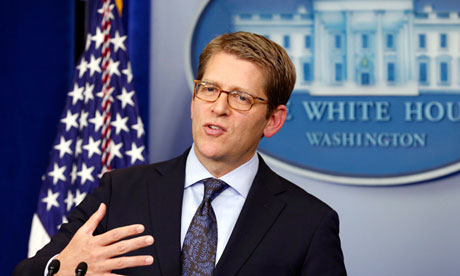The Obama administration is making no attempt to hide its dismay over David Cameron's speech and the prospect of the UK exiting theEuropean Union, a move which Washington views as undermining prospects for a united military and foreign policy.
The White House reiterated its belief on Wednesday that Britain is stronger within Europe but ducked the fresh opportunity to lean on Downing Street over the issue, favouring more conciliatory language than in recent weeks.
"We welcome the prime minister's call for Britain to remain in Europe," said spokesman Jay Carney. "We believe that the UK is stronger as a result of its EU membership and as a result of having the UK in, the EU is stronger."
But asked about prospects of a referendum on EU membership, Carney would only say: "The internal processes by which these matters are discussed are a matter for local governments."
In contrast with a decade ago, when the Bush administration appeared to welcome division in Europe, the Obama administration values a united Europe, not least in sharing the military burden of being the world's policeman. Unusually for Washington, while acknowledging it is a matter for the British public, it has made its opposition public.
The White House, after a call between Obama and Cameron on January 17, issued a statement saying: "The prime minister set forth his thinking on UK-EU relations in light of his upcoming speech. The president underscored our close alliance with the United Kingdom and said that theUnited States values a strong UK in a strong European Union, which makes critical contributions to peace, prosperity, and security in Europe and around the world."
The mantra 'a strong UK in a strong European Union' is explicit and is repeatedly underscored by the state department. Victoria Nuland, the state department spokeswoman, facing a series of questions from reporters earlier this month, said: "We value a strong UK voice in the EU and that the European Union is a critical partner on global issues, and we welcome an outward-looking European Union with the UK in it."
When Obama became president in 2009, leading members of his foreign and security team proposed retilting the balance away from Europe, with the cold war mentality of fear of Russia largely redundant, to the Pacific, to face the challenge from China. Obama reiterated in the run-up to re-election in November last year that a focus on the Pacific remained one of his priorities.
But his position on Europe has softened over the last four years, seeing a value in an alliance that saw European engagement in various troublespots, primarily France and Britain taking a lead in Libya.
Although the Obama administration pays lip-service to the "special relationship", it has forged closer ties with Germany, to the chagrin of Britain.
Matthias Matthijs, Washington-based assistant professor and European specialist at the School of Advanced International Studies of Johns Hopkins University, said: "I think the Americans are greatly frustrated with all this UK fickleness on Europe."
He contrasted the US position now with a decade ago, when the Bush administration was worried about a united Europe posing a geopolitical challenge to the US and welcomed division between "old" and "new" Europe.
Now, the US wants a united Europe to share the diplomatic and military burden in a more plural world. "If the UK is out, then you can forget about a common European foreign policy that the rest of the world will pay attention to," Matthijs said. "If eurosceptics in the UK think that the Americans would applaud their exit from the union, they could not be more wrong."
There was no official response from the Chinese government, but experts there said that the spectre of a 2017 in-out referendum could damage Sino-UK economic relations and unsettle Chinese business leaders who have come to rely on Britain as a key player in Sino-EU trade.
The EU is China's largest trading partner – the two economies trade over £840m per day – and as such, China's regional economic allegiances are clear. "If the UK really exits the European Union, this will create some uncertainties for Chinese business leaders," said Gary Liu, a professor at the China Europe International Business School in Shanghai. Withdrawal, he added, could "create actual cost for Chinese people to do business in Europe."
Chinese foreign policy officials would perceive a split between the UK and the EU as a possible harbinger of closer ties between UK and the US – not a China-friendly development, given a recent surge of distrust in Sino-US affairs. "We all know that Great Britain is a special ally of the United States, and Great Britain is also a very important country in the European Union," said Shi Yinhong, a professor of international relations at Renmin University in Beijing. "But if you abandon [the latter] identity, you will only have one identity in Chinese eyes."
Officials at the Indian ministry of external affairs said they were considering the text of the speech, but would be unlikely to make any official comment. Professor G Parthasarathy, a former diplomat, said that as the EU and the UK were trading partners there was some interest in the changing dynamics of the relationship between the two.
"Britain has a dilemma of which way to look, to Washington or to Europe, and this a continuation of that. Europe gets stuck in internal issues and that does have an effect on [India's] economic cooperation," he said.

No comments:
Post a Comment